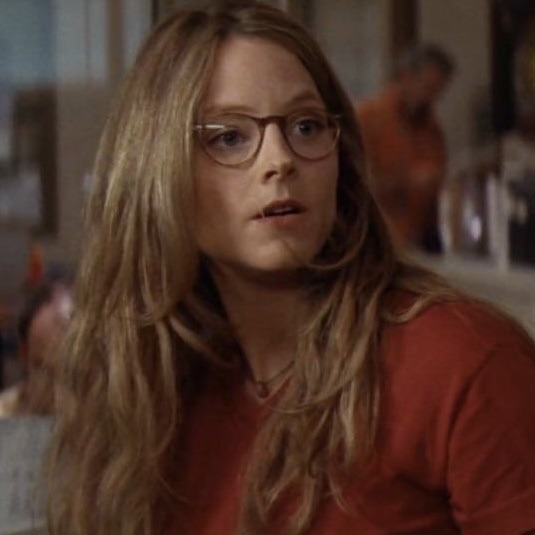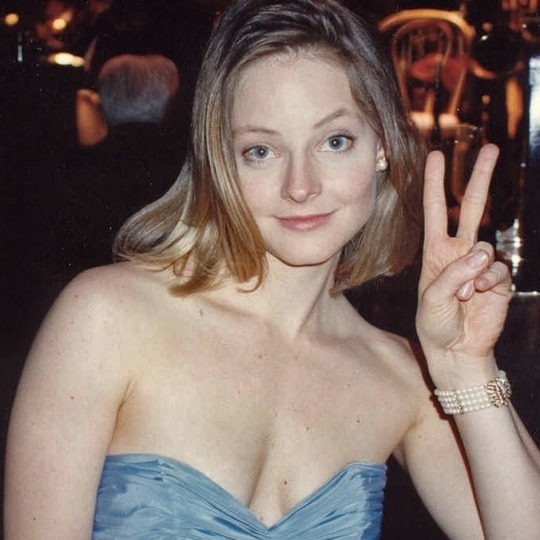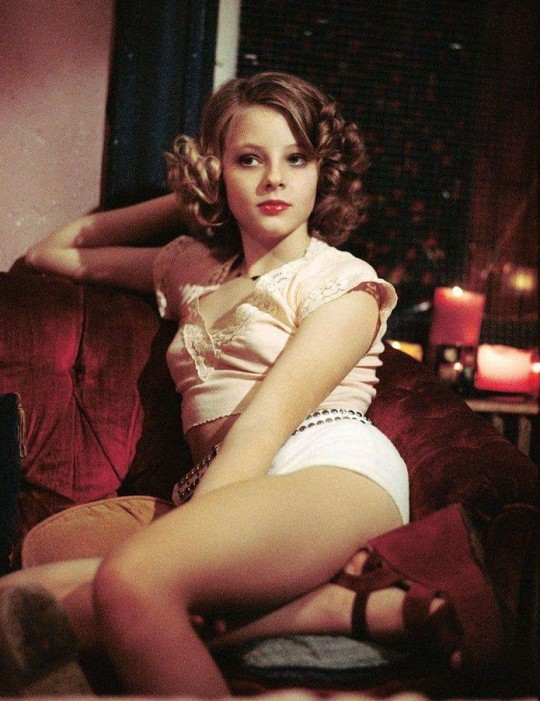#iris steensma
Text









jodie foster 🐑
#whamicon 2024#actress icons#jodie foster#jodie foster icon#jodie foster icons#young jodie foster#the silence of the lambs#silence of the lambs#true detective#nyad#taxi driver#iris steensma#clarice starling#meg altman#lesbian icons#lesbian icon
88 notes
·
View notes
Text

I think that Cancers make the best lovers
#taxi driver#martin scorsese#robert de niro#travis bickle#jodie foster#Iris Steensma#neo noir#psychological thriller#scenephile#movie quotes#film quotes#movie scenes#movie scene#film scene#cancer
75 notes
·
View notes
Note
fifty ways to leave! SOOOO legit. Please regale us.
yessss I loved writing this fic but it feels like it's been ten thousand years so thank you for letting me revisit it
"fifty ways to leave", Taxi Driver (1976), Iris Steensma & Travis Bickle postcanon spectral gen written for Yuletide 2020
One thing I wanted to deal with in this fic is the film's uneasy conclusion with Iris being returned to her parents -- while being sexually exploited by Sport and witnessing violent crime is obviously a pretty awful state of affairs, there's plenty of stuff back at home that fucks kids up too, and I didn't like the thought that her right path in life necessarily meant going back to a settled socially-acceptable life. At the same time, older now, she's still stuck making compromises, selling a tacky fantasy, and being subordinated to dipshit men -- getting a shitty boring office job means forcing herself into a role she doesn't like much, both closeting herself as a queer woman and kind of doing workplace drag just to get through the door to interview. I wanted to write about Iris turned loose back in the urban wild without another person controlling her and trying to figure out how she wants to live.
I love writing fic about characters whose actors have work spanning decades where it's especially tempting to imagine those characters growing up/spanning time periods -- I just realized thanks to photos and shit I am now able to visualize Jodie Foster circa 1982-3 (with much nicer swingier hair than I have written Iris with in this fic) and it's so fun.
I love, love, love ghost stories and especially vanishing-hitchhiker-type stories of a living person sharing time and space with someone who couldn't possibly be there -- a phantom cabbie is just that turned inside out and I had fun trying to figure out the kind of visual signifiers that would flag to Iris that she's out of place even before she recognizes Travis. She's left with this tangible, physical record of their encounter, Travis' jacket as this object that's gotten dislodged from linear time, and in addition to continuing the vanishing-hitchhiker riff
Rereading now I think I also wanted to do some stuff with the physical residues of smoky, sooty, jizz-stained early-70s New York -- scent is a really powerful trigger for memories both good and bad and I know in my heart that both Travis Bickle and his taxi absolutely reek. Iris is as merciless to her own parents and upbringing in this fic as Travis is sentimental toward his own, but it's taken her this long to get that perspective on both of them and on Travis himself now that she's encountering him in the metaphorical flesh again. And I guess a ghost is another kind of residue??? Idk man.
If this fic has a sibling in the stuff I've written it's my fic for The Stand, "deep red bells" -- it's set in a no-Captain-Trips (or at least pre-Captain Trips) timeline where Nadine is trying to put together the information she can about this awful demon lover who's still pursuing her even a universe away, whose presence she can identify by its residues even if she can't find Flagg himself. If that's more about chasing ghosts this fic is just about Iris kind of living with them, and with the lack of satisfying conclusion and emotional resolution that a lot of people just end up living with. Iris in this fic is going to end up living to be like 85 and living an incredibly varied and rich life (idk what she'll end up doing -- feminist organizer, writer, artist, complicated person and incredible dresser and haunted urban waif) but she'll be carrying around the memories of this wildly unsettled, ambivalent experience and at times they'll be unbearably vivid even as they get more chronologically remote.
The title is because I cannot think about Paul Simon without laughing.
...I just realized that having Iris be raised Catholic opposite Travis Bickle's Schrader-given Presbyterian-coding gives them the same religious backgrounds as my own parents. I am going to try and avoid thinking about wtf this means about me psychologically.
5 notes
·
View notes
Text

Martin Scorsese, Robert De Niro, and Catherine Scorsese (Martin's mom) on the set of Taxi Driver, 1976. Mrs. Scorsese, April 16, 1912 – January 6, 1997, was in the following films:
1964 It's Not Just You, Murray! as Mother
1967 Who's That Knocking at My Door as Mother
1973 Mean Streets as Woman On Landing (uncredited)
1974 Italianamerican as herself
1976 Taxi Driver as Ivy Steensma, Iris’ Mother (uncredited)
1982 The King of Comedy as Rupert's Mom
1983 Easy Money as Nicky Cerone's Mother
1984 The Muppets Take Manhattan as Unknown (uncredited)
1985 After Hours as Elderly Lady At The Café Sitting Back to The Cashier (uncredited)
1986 Wise Guys as Birthday Guest
1987 Moonstruck as Customer At Bakery
1990 Goodfellas as Mrs. DeVito, Tommy's Mother
1990 The Godfather Part III as Woman In Cafe #1
1991 Cape Fear as Fruitstand Customer
1993 The Age of Innocence as Elderly Woman At Jersey City Station (uncredited)
1994 Men Lie as Granddaughter Witness
1995 Casino as Piscano's Mother (final film role)
5 notes
·
View notes
Text

199 notes
·
View notes
Photo










Items From Forever 21
Tie-Front Top | Smocked Frill Top
Embroidery Top | Daisy Denim Skirt
Striped Crop Top | Chambray Shorts
Cherry Denim Skirt | Heart Tie Top
Babygirl Bodysuit | Ruffle Ribbed Top
#pink#style#ootd#babygirl#ruffle#baygirl#cherry#daisy#forever21#Forever 21#tie front crop top#tie front#Iris#iris steensma#taxi driver#smocked crop top#crop top#top#embroidery#embroidered#flower embroidery#daises#denim#denim skirt#chambray#chambray shorts#shorts#ruffle shorts#striped#stripe
101 notes
·
View notes
Video
TAXI DRIVER (1976)
“Are you talkin' to me? Well, I'm the only one here.”
—Travis Bickle in "Taxi Driver"
It is the last line, "Well, I'm the only one here," that never gets quoted. It is the truest line in the film. Travis Bickle exists in "Taxi Driver" as a character with a desperate need to make some kind of contact somehow--to share or mimic the effortless social interaction he sees all around him, but does not participate in.
The film can be seen as a series of his failed attempts to connect, every one of them hopelessly wrong. He asks a girl out on a date, and takes her to a porno movie. He sucks up to a political candidate, and ends by alarming him. He tries to make small talk with a Secret Service agent. He wants to befriend a child prostitute, but scares her away. He is so lonely that when he asks, "Who you talkin' to?" he is addressing himself in a mirror.
This utter aloneness is at the center of "Taxi Driver," one of the best and most powerful of all films, and perhaps it is why so many people connect with it even though Travis Bickle would seem to be the most alienating of movie heroes. We have all felt as alone as Travis. Most of us are better at dealing with it.
Martin Scorsese's 1976 film (re-released in theaters and on video in 1996 in a restored color print, with a stereophonic version of the Bernard Herrmann’s core) is a film that does not grow dated, or over-familiar. I have seen it dozens of times. Every time I see it, it works; I am drawn into Travis' underworld of alienation, loneliness, haplessness and anger.
It is a widely known item of cinematic lore that Paul Schrader's screenplay for "Taxi Driver" was inspired by "The Searchers," John Ford's 1956 film. In both films, the heroes grow obsessed with "rescuing" women who may not, in fact, want to be rescued. They are like the proverbial Boy Scout who helps the little old lady across the street whether or not she wants to go.
"The Searchers" has Civil War veteran John Wayne devoting years of his life to the search for his young niece Debbie (Natalie Wood), who has been kidnapped by Commanches. The thought of Debbie in the arms of an Indian grinds away at him. When he finally finds her, she tells him the Indians are her people now, and runs away. Wayne then plans to kill the girl, for the crime of having become a "squaw." But at the end, finally capturing her, he lifts her up (in a famous shot) and says, "Let's go home, Debbie."
The dynamic here is that Wayne has forgiven his niece, after having participated in the killing of the people who, for 15 years or so, had been her family. As the movie ends, the niece is reunited with her surviving biological family, and the last shot shows Wayne silhouetted in a doorway, drawn once again to the wide open spaces. There is, significantly, no scene showing us how the niece feels about what has happened to her.
In "Taxi Driver," Travis Bickle also is a war veteran, horribly scarred in Vietnam. He encounters a 12-year-old prostitute named Iris (Jodie Foster), controlled by a pimp named Sport (Harvey Keitel). Sport wears an Indian headband. Travis determines to "rescue" Iris, and does so, in a bloodbath that is unsurpassed even in the films of Scorsese. A letter and clippings from the Steensmas, Iris' parents, thank him for saving their girl. But a crucial earlier scene between Iris and Sport suggests that she was content to be with him, and the reasons why she ran away from home are not explored.
The buried message of both films is that an alienated man, unable to establish normal relationships, becomes a loner and wanderer, and assigns himself to rescue an innocent young girl from a life that offends his prejudices. In "Taxi Driver," this central story is surrounded by many smaller ones, all building to the same theme. The story takes place during a political campaign, and Travis twice finds himself with the candidate, Palatine, in his cab. He goes through the motions of ingratiating flattery, but we, and Palatine, sense something wrong.
Shortly after that Travis tries to "free" one of Palatine's campaign workers, a blonde he has idealized (Cybill Shepherd), from the Palatine campaign. That goes wrong with the goofy idea of a date at a porno movie. And then, after the fearsome rehearsal in the mirror, he becomes a walking arsenal and goes to assassinate Palatine. The Palatine scenes are like dress rehearsals for the ending of the film. With both Betsy and Iris, he has a friendly conversation in a coffee shop, followed by an aborted "date," followed by attacks on the men he perceived as controlling them; he tries unsuccessfully to assassinate Palatine, and then goes gunning for Sport.
There are undercurrents in the film that you can sense without quite putting your finger on them. Travis' implied feelings about blacks, for example, which emerge in two long shots in a taxi driver's hangout, when he exchanges looks with a man who may be a drug dealer. His ambivalent feelings about sex (he lives in a world of pornography, but the sexual activity he observes in the city fills him with loathing). His hatred for the city, inhabited by "scum." His preference for working at night, and the way Scorsese's cinematographer, Michael Chapman, makes the yellow cab into a vessel by which Travis journeys the underworld, as steam escapes from vents in the streets, and the cab splashes through water from hydrants--a Stygian passage.
The film has a certain stylistic resonance with "Mean Streets" (1973), the first Scorsese film in which Keitel and De Niro worked together. In the earlier film Scorsese uses varying speeds of slow-motion to suggest a level of heightened observation on the part of his characters, and here that technique is developed even more dramatically; as the taxi drives through Manhattan's streets, we see it in ordinary time, but Travis' point-of-view shots are slowed down: He sees hookers and pimps on the sidewalks, and his heightened awareness is made acute through slow motion.
The technique of slow motion is familiar to audiences, who usually see it in romantic scenes, or scenes in which regret and melancholy are expressed--or sometimes in scenes where a catastrophe looms, and cannot be avoided. But Scorsese was finding a personal use for it, a way to suggest a subjective state in a POV shot. And in scenes in a cab driver's diner, he uses closeups of observed details to show how Travis's attention is apart from the conversation, is zeroing in on a black who might be a pimp. One of the hardest things for a director to do is to suggest a character's interior state without using dialog; one of Scorsese's greatest achievements in "Taxi Driver" is to take us inside Travis Bickle's point of view.
There are other links between "Mean Streets" and "Taxi Driver" that may go unnoticed. One is the "priest's-eye-view" often used in overhead shots, which Scorsese has said are intended to reflect the priest looking down at the implements of the Mass on the altar. We see, through Travis' eyes, the top of a taxi dispatcher's desk, candy on a movie counter, guns on a bed, and finally, with the camera apparently seeing through the ceiling, an overhead shot of the massacre in the red-light building. This is, if you will, the final sacrifice of the Mass. And it was in "Mean Streets" that Keitel repeatedly put his finger in the flame of a candle or a match, testing the fires of hell: here De Niro's taxi driver holds his fist above a gas flame.
There has been much discussion about the ending, in which we see newspaper clippings about Travis' "heroism," and then Betsy gets into his cab and seems to give him admiration instead of her earlier disgust. Is this a fantasy scene? Did Travis survive the shoot-out? Are we experiencing his dying thoughts? Can the sequence be accepted as literally true?
I am not sure there can be an answer to these questions. The end sequence plays like music, not drama: It completes the story on an emotional, not a literal, level. We end not on carnage but on redemption, which is the goal of so many of Scorsese's characters. They despise themselves, they live in sin, they occupy mean streets, but they want to be forgiven and admired. Whether Travis gains that status in reality or only in his mind is not the point; throughout the film, his mental state has shaped his reality, and at last, in some way, it has brought him a kind of peace.

— Roger Ebert
Cast:
Robert De Niro as Travis Bickle; Jodie Foster as Iris; Albert Brooks as Tom; Harvey Keitel as Sport; Leonard Harris as Palantine; Peter Boyle as Wizard; Cybill Shepherd as Betsy.
Directed by Martin Scorsese
Produced by Michael Phillips, Julia Phillips, Michael
Screenplay by Paul Schrader
Edited by Marcia Lucas, Tom Rolf and Melvin Shapiro
Music by Bernard Herrmann
Cinematography by Michael Chapman
Written by Paul Schrader
Photographed by Michael Chapman
Rated R for violence and profanity | Crime > Drama > Thriller | 112 minutes
#taxi driver#robert de niro#jodie foster#albert brooks#harvey keitel#leonard harris#peter boyle#cybill shepherd#martin scorsese#michael phillips#julia phillips#michael#paul schrader#marcia lucas#tom rolf#Melvin Shapiro#bernard herrmann#rated r
1 note
·
View note
Photo

Day 162 - Iris Steensma "I don't like what I'm doing, Sport." FROM MY CLOSET (Spending every day in a different costume) (Blog link in bio) https://facebook.com/frommyclosettoday Photo credits @marcmahfouz •▪• #frommycloset #irissteensma #taxidriver #jodiefoster #movie #film #crime #12yearold #costume #ootd #Monday #outfitoftheday #abitlatebuthere #canon7d #photography #scene #moviescene #1976 #classic #cosplay #cosplayer #blog #challenge #cosplayforacause #beyourself #bereal #beyou
#moviescene#frommycloset#12yearold#costume#photography#jodiefoster#challenge#taxidriver#cosplayer#monday#bereal#cosplayforacause#beyou#irissteensma#classic#abitlatebuthere#crime#beyourself#canon7d#film#outfitoftheday#ootd#1976#scene#cosplay#blog#movie
1 note
·
View note
Text
@steensma ------ IRIS STEENSMA / ONE OF US BY ABBA.

“they passed me by, all of those great romances,” richie says with a dramatic sigh, sliding down in his chair and propping his feet up onto the table in front of him.
0 notes
Photo

The Enduring Style of Taxi Driver’s Iris “Easy” Steensma.
133 notes
·
View notes
Text
Yuletide 2020 reveals!
Greetings, new year squad!
For Yuletide this year I got lovely, lovely Rome fic, which feels like the perfect capstone to how much that show has been saving my sanity this year.
aegrescit medendo by jouissant
Deals with the historical Octavian’s illnesses, but also his show counterpart’s weird fraught horniness, which I adore -- his complicated relationship with Caesar and later with Antony, which brings us to my favorite tag to see on HBO Rome fic ever: choking. Please read it and revel in my weird Roman dudes.
This year I wrote some stuff:
Star Of Bliss written for misantlery
The Lion In Winter (1968), 4.2k, Eleanor of Aquitaine-centric, pre and post-canon; five different Christmases, four different Christmas courts.
fifty ways to leave written for outruntheavalanche
Taxi Driver (1976), 1.5k, Iris Steensma & Travis Bickle, post-canon; whatever the reverse of hitchhiking ghosts is.
a pathless comet, and a curse written for blueteak
Edward, Edward - Lolah Burford, 6.5k, James Noel Holland/Edward Clare Amstrong, explicit; just bucketloads of 18th century-inflected flagellation porn and figging.
sykon written for silvered
HBO’s Rome, 1.6k, Cleopatra/Mark Antony, explicit; cunnilingus, complex jealousies, and shared reminisces about schtupping Caesar.
pur ceu ke beus e gens esteit written for LearnedFoot
Pilgrimage (2017), 1.6k, Brother Diarmuid/Mute, explicit; glad-to-be-alive sex in the great outdoors feat. intercrural sex.
4 notes
·
View notes
Text
|| ► ||: Tag Dump One
#|| ► ||:GOD’S LONELY MAN (self)#|| ► ||:THEY CANNOT TOUCH HER (Betsy)#|| ► ||:SWEET IRIS (Iris Steensma)#|| ► ||:WE ARE THE PEOPLE (Palantine)#|| ► ||:DAYS GO ON & ON. THEY DON’T END (aesthetic)#|| ► ||:BY THE TIME YOU READ THIS I WILL BE DEAD(musing)#|| ► ||:TONY THE FUCKING TIGERCLAW(ooc)
0 notes
Text
Taxi Driver
Directed by Martin Scorsese and written by Paul Schrader, who drew on his own experiences of being a taxi driver in New York; Taxi Driver is considered one of the greatest films ever made, and rightly so.
In a broad sense, the film tells the story of Travis Bickle (Robert De Niro), a 26 year old Vietnam War veteran trying to find his place in the world. Early scenes of him writing down his thoughts show a young man in the midst of an existential crisis. Through the films vehicle of him manoeuvring through New York in his taxi, we see the world through his eyes, and all that’s rotten with it.
Early on in the film we see that Travis is smitten by Betsy (Cybill Shepard), a political campaign volunteer. It is common for people to try and make themselves ‘whole’ by finding their other half, and we see Travis himself giving this a go. We see Betsy early on the film; blonde, slim, and wearing a not-too-revealing white dress, angelic in appearance and arguably Travis’s view of the perfect woman.
After sitting outside of her office in his taxi, he eventually musters up the energy to speak to her and secures a date. The audience sees a charming young man, full of confidence, a story told over and over again. On this date, she informs him that a line from the Kris Kristofferson song Pilgrim reminds her of him, in that he’s a “walking contradiction”. Now as charming as we see him here, on the second date things take a turn for the worst. After securing a second date later Betsy is freaked out after being taken to a porno theatre, something she finds extremely distressing.
We see a man who truly is a walking contradiction and who has very little understanding of how to talk to someone whom he likes. He is an outlier to mainstream society – and in fact to Betsy – he is the ‘scum’ that he speaks of earlier on in the film when referring to, for example, pimps and prostitutes.
Travis also projects his desired qualities of a woman onto Betsy, which she was unable to meet. This rejection can, on a chronological basis in the film, be seen as his first step on the descent into madness. It’s also a classic trigger for male characters to then leap (firstly) within themselves and (secondly) take their frustrations out onto the world, which is exactly what Travis ends up doing.
Another way that Travis tries to make himself whole – at least for a brief period – is through political affiliation. As luck would have it, Travis finds presidential candidate Charles Palantine (Leonard Harris) in his Taxi. Travis later tells him that for the city of New York, they need to “flush the whole fucking thing down the toilet.” Charles says that he understands, but it won’t be easy.
We later see that Travis attempts to assassinate the very man whom he once supported. This off course supplants everything that came before it – and is ultimately his rejection of politics – or at least politics for the common man – in that nothing changes for him, no matter how politically involved he gets or how much he cares.
There is only one incident in which Paul Schrader, the screenwriter, explicitly demonstrates any dialogue on the concept of identity and belonging. We soon see Travis mingling with the other taxi drivers and later he asks to speak to driver Wizard (Peter Boyle) who gives him a lecture about ‘a man becomes what he does for a living’. In this incident, Travis is so bemused by Wizard’s monologue that he dismisses the idea of a person’s job as being the indication of who that person is. Instead Travis almost vaingloriously shows he doesn’t understand what Wizard is saying but that he has “some crazy ideas.” Travis’s notion that he is bigger than his job is something that weighs him down. We see in the final act of the film how his ambition to live up to his own potential (as judged by himself) transforms him.
We later see Travis pull up to a block of apartments with a homicidal passenger (Martin Scorsese) who informs Travis that he’s going to kill the man that’s been sleeping with his wife. He goes into gruesome details of the weapon he plans to use, and how he plans to kill them both. As an audience, this is the first and only time we see Travis confront someone who is truly mad. We are therefore able to see that to an outsider, an act of such ferocity is truly mad, as it outlies what most people would do when faced with the same situation. However it also shows us that madness can afflict anyone. Travis’s shock when interacting with this man mirrors our shock in seeing Travis final act. We never actually find out if the passenger went through with what he said. All we get to see is Travis going through with what he planned. This demonstrates the difference between simple ‘words’ and ‘actions’. We all have homicidal tendencies within us, but almost all of us suppress them – that is the difference between us and Travis.
The final act of the film shows that Travis (and we, the audience, through him) are responsible for vindicating our existence, to show our worth through our actions. After befriending a 12 year old prostitute, Iris “Easy” Steensma (Jodie Foster), he decides that he’s going to save her from the hell of a life she’s falling into.
Harvey Keitel plays Charles “Sport”, Iris’s controlling pimp, who through physical and emotional manipulation prevents Iris from escaping her life. Scorsese has stated in the past that a pimp in this era certainly wouldn’t have been white, but black, but in order to not inflame racial tensions, Harvey was chosen to play the pimp. Sport is angled as Travis’ direct opposite – he happily manipulates others to get what he wants – whilst Travis, a loner and vigilante, out-lies mainstream society, at times barely understanding it, for example in the ‘porno theatre’ incident mentioned above.
Travis later arms himself, this being, as he would believe, his final act. But it isn’t. He kills those in charge of Iris’s demise, including Sport and is hailed a hero (probably also by the police, who don’t arrest him even after his antics as a vigilante). Later we are shown that Travis has pinned up an article on a wall in his humble abode which reports his victory over Sport and others. This article is a trophy to his own existence, and his own courage. In Travis’s circumstances, the fact that he’s had his ‘fifteen minutes of fame’ is enough for him to be happy with himself, even if, on the grand scale, nothing is likely to have changed.
At the end of the film, we see Betsy being picked up in Travis’s taxi informing him that she’s heard about his heroics. Once she’s been dropped off she offers to pay for the Taxi ride, however Travis drives off without taking her money. This is ultimately Travis having the last laugh – in that not only does he want her money, but he doesn’t want her. It could also be the idea that he is dismissing the whole notion of a man and a woman together as one – and that at least for him, he is more ‘whole’ in driving his taxi and being alone, than he would ever be with another person.
0 notes
Photo

Iris Steensma Inspired
Tie Front Crop Top, Shorts, Shoes, Hat, Bag & Sunglasses
#taxi driver#70s fashion#70s#iris steensma#cherry#tie front#tie front crop top#iris#crop top#shorts#Yesstyle#oasap#hat#bag#sunglasses#wedges#red#shoes#polyvore
49 notes
·
View notes
Photo

54 notes
·
View notes